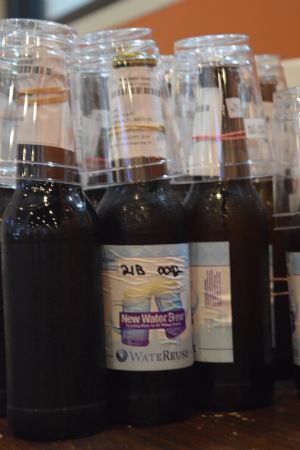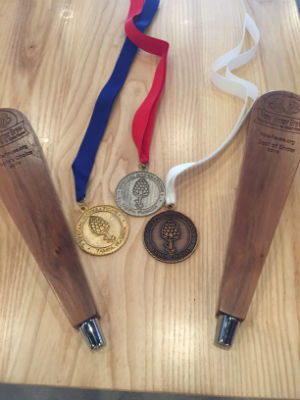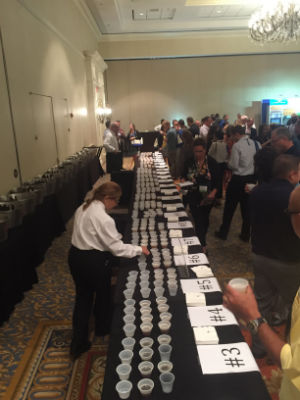Interested in Education/Training?
Get Education/Training articles, news and videos right in your inbox! Sign up now.
Education/Training + Get Alerts
 Dan Shirah saw the looks and sensed the trepidation.
Dan Shirah saw the looks and sensed the trepidation.
Sure, Shirah is an experienced home brewer, but some folks wondered how his latest creation would taste. After all, it was brewed with purified wastewater.
But ultimately, everyone liked the beer — so much that Shirah’s creation was one of the big winners at the New Water Brew Contest, held Sept. 10 and 11 in Tampa, Florida. The contest, sponsored by the WateReuse Association, challenged Florida home-brewers to turn recycled water into beer. More than 100 brewers participated, and on Sept. 10, more than two-dozen certified beer tasters judged beers in four categories and also awarded a best-of-show prize. The next day, top-rated beers were served at a welcome reception for the 31st annual WateReuse Symposium, and attendees voted for their favorite in the People’s Choice Award, won by Shirah’s tropical stout.
“I asked my fiancé and several friends to try the beer and give me their feedback,” Shirah says. “I initially told some where the water came from, and others I told them after they drank it (and praised how good it was). The interesting angle I observed was that the people who I told where the water came from before they drank it seemed to approach the glass with hesitation before smelling or tasting the beer. The stigma being, ‘Oh man, is this going to smell or taste like poop?’ But in the end, everyone enjoyed it.”
 The water used in the New Water Brew Contest came from homes and small businesses in the Tampa area. Operators used multiple technologies to purify the water and make it safe for consumption, and the recycled water was tested to make sure it met tough water quality standards for drinking. WateReuse partnered with three water industry titans — GE, Xylem and Tetra Tech — to purify the water via a multistep process that included stringent filtration and disinfection methods.
The water used in the New Water Brew Contest came from homes and small businesses in the Tampa area. Operators used multiple technologies to purify the water and make it safe for consumption, and the recycled water was tested to make sure it met tough water quality standards for drinking. WateReuse partnered with three water industry titans — GE, Xylem and Tetra Tech — to purify the water via a multistep process that included stringent filtration and disinfection methods.
“Water reuse helps communities provide a safe, reliable, locally controlled supply of water, which protects the environment, sustains a robust economy and ensures a high quality of life,” the group’s release says. “To meet the growing demand for water amid shrinking supplies, more … communities are reusing water for a variety of purposes.”
That includes drinking, irrigation, power generation and industrial manufacturing. WateReuse said Florida has reused water from homes and small businesses for landscape irrigation since 1966. In 1977, it became the first state to build a large urban reuse system, and until recently, it led the nation in water reuse. Other top water-reuse states include Arizona, California, Colorado, Idaho, Nevada, Oregon, Texas and Washington.
The home-brewing contest was a fun, natural way for WateReuse to show people that wastewater has value and can be purified to use safely for many purposes, including brewing.
Shirah heard about the competition from John O’Meara, of the WateReuse Association, when the men judged another home-brewing competition together. He was intrigued by the challenge of brewing with recycled water.
 “I had never worked with recycled water before, but was familiar with other treatments, such as reverse osmosis, as it’s a common type of water used by home brewers who want to build their own water profile from scratch,” he says. “The biggest challenge was deciding which type of beer to make and how to modify the water. Since the water was purified, filtered and (had gone through other processes), it was pretty much stripped down to pure form. This provides me with a blank canvas (water profile) that I could modify to suit my beer selection. I increased the calcium and the sulfates in the water to provide a nice base for the British ale yeast I used.”
“I had never worked with recycled water before, but was familiar with other treatments, such as reverse osmosis, as it’s a common type of water used by home brewers who want to build their own water profile from scratch,” he says. “The biggest challenge was deciding which type of beer to make and how to modify the water. Since the water was purified, filtered and (had gone through other processes), it was pretty much stripped down to pure form. This provides me with a blank canvas (water profile) that I could modify to suit my beer selection. I increased the calcium and the sulfates in the water to provide a nice base for the British ale yeast I used.”
Shirah said his fellow contestants also embraced the concept, even if they chuckled now and then about the water’s origins.
“Myself and two other members from my home-brew club entered this competition,” he says. “I’d be lying if I didn’t say that at first we had a little laugh over the idea of where the water came from. Speculation was had about porta-potties, sewage runoff. … But then, John provided us with the breakdown of the water after it had been treated in several different ways, and we quickly saw that it really wasn’t all that different from the normal reverse-osmosis water we can buy.”
In fact, Shirah said he’d have no problems brewing more beer with recycled water. And he’d love to enter the New Water Brewing Contest again.
“I honestly believe there would be no discernible difference to a Beer Judge Certification Program judge on whether a beer was made with tap, spring, reverse-osmosis or recycled water,” he says. “It’s more about what you do with the water once you get it than where it originally came from.”





